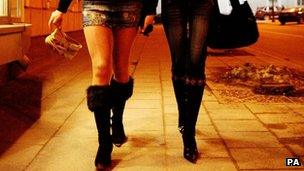New human trafficking law to make prosecutions in Scotland easier
- Published

A high number of trafficking victims are used for the sex trade
The Scottish government will introduce a new law that aims to crack down on human trafficking.
It is hoped that the statutory aggravation legislation will make it easier to prosecute the perpetrators.
The move was one of a series of measures agreed at a summit on human trafficking held in Edinburgh.
The meeting came on the day it was revealed there were 93 suspected victims of the crime in Scotland last year.
The inter-departmental ministerial group, external also showed the majority of trafficking victims north of the border came from Romania, the Czech Republic and Slovakia.
For the UK as a whole it was found that there were 946 victims, compared with 710 in 2010.
Trafficking gangs in China, Vietnam, Nigeria and eastern Europe now pose the biggest threat in the UK, the group reported.
Delegates at the Edinburgh summit agreed that if a statutory human trafficking criminal aggravation was introduced it would mean existing criminal offences could be "aggravated" in future if it can be proved that the underlying offence was committed in connection with human trafficking.
The gathering also agreed that;
there was a need to have greater awareness and improved training among frontline professionals
to put measures in place to improve care and support for adult and child victims
and to put in place steps to ensure robust data collection and analysis.
Mr MacAskill said: "This summit today has given us the opportunity to bring together all the organisations with a clear role in enforcing the law, raising awareness with frontline staff or delivering care and support to victims.
"I am very pleased that so many different organisations have come together to come up with a range of actions we can take to continue the fight against this abhorrent crime.
"We want to send out the message that Scotland is closed for business to traffickers. We will do everything in our power to crack down on those who exploit people for forced labour, sex or domestic servitude and making trafficking easier to prosecute will give our law enforcement agencies a powerful new tool in their armoury."
Those attending the summit included the chief constable of the new Police Service of Scotland Stephen House; the Advocate General for Scotland, Lord Wallace of Tankerness; Scotland's Commissioner for Children and Young People Tam Baillie as well as representatives from the Crown Office and local government organisation Cosla.
- Published18 October 2012
- Published14 October 2012
- Published19 July 2011